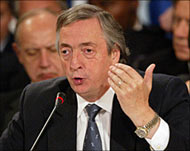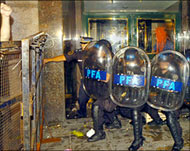Argentina marks coup anniversary
Families of the 30,000 people believed killed during Argentina’s Dirty War have led commemorations to mark the 30th anniversary of the coup that brought the military to power.

Amid simmering resentment over the lack of punishment of top military officers involved in the 24 March 1976 coup, thousands descended on the Plaza de Mayo square in central Buenos Aires on Friday.
The Mothers of Plaza de Mayo, who held weekly protests in the square for much of the past three decades, held an all night vigil to mark the grim anniversary.
Adolfo Perez Esquivel, Argentine Nobel Peace Prize winner, said: “We all want to be present to say ‘never again’ to military dictatorship.”
Films on the dictatorship were shown on a giant screen in the square at the moment early in the morning when the military moved against Isabel Martinez de Peron, the president.
A major rally was held in the square on Friday.
Amnesties questioned
Nestor Kirchner, the president, urged the country’s judiciary to quickly rule on the legality of amnesties granted to the military leadership, as he unveiled a plaque at the national military college declaring “no more coups d’etat and state terrorism”.
“How can we live together while there is still impunity,” Kirchner asked at the ceremony, at which he argued “only by punishing the guilty will the innocent be freed from blame”.
 |
|
Kirchner: Amnesties for military |
Kirchner said he believed amnesties given to top officers in 1990 by Carlos Menem, the then president, should be ruled in illegal.
In a new gesture to human-rights groups and the families who have campaigned for justice, the government this week ordered the military to open up archives that might shed light on some unsolved cases.
Kirchner’s government has sought to meet many of the demands of human-rights groups to act over the junta’s abuses.
It cancelled laws that granted amnesty to top officers and has said it will cancel presidential pardons given to officers tried in 1985.
But it is waiting for courts to rule whether the amnesties are constitutional before ordering prosecutions.
Resentment
Most of the 30,000 junta victims were believed to have been tortured and assassinated, and there is widespread anger that most junta leaders have never been punished.
Menem issued blanket amnesties in a bid to move past an issue so explosive that it was feared at the time it could rock a fragile democracy.
 |
|
Ex-military ruler Videla is under |
Now, with years of democratic rule behind it, many Argentines see Menem’s action, at the time explained as a way of moving forward, as an unacceptable sweeping under the rug of the military crimes.
General Jorge Videla, now 80, who led the coup, lives in a Buenos Aires apartment with his wife.
He is under house arrest still awaiting a final trial for his role in the abduction of babies of imprisoned dissenters.
His deputy, Admiral Emilo Massera, who was sentenced to life imprisonment in 1985, remains outside prison but in a near coma.
Others await trial, including the notorious “Blond Angel of Death”, Captain Alfredo Astiz, who has been convicted in France for kidnapping and murdering two French nuns.
Hundreds free
Hundreds of police and military accused of murder, torture and human-rights violations continue to live freely following the amnesties and pardons.
The dicatorship has left deep scars.
Relatives are battling to identify bodies of the victims that are still being uncovered.
The Grandmothers of the Plaza de Mayo has been investigating to gain the identity of the babies of political detainees who were taken from their mothers and in many cases given to military families.
Adriana Calvo said: “Impunity has made society more sick than it was under the dictatorship. They imposed fear, but the impunity has reinforced it over the years.”
Calvo, arrested while pregnant in 1977, was released with her baby daughter after a few months in prison, where the girl was born.